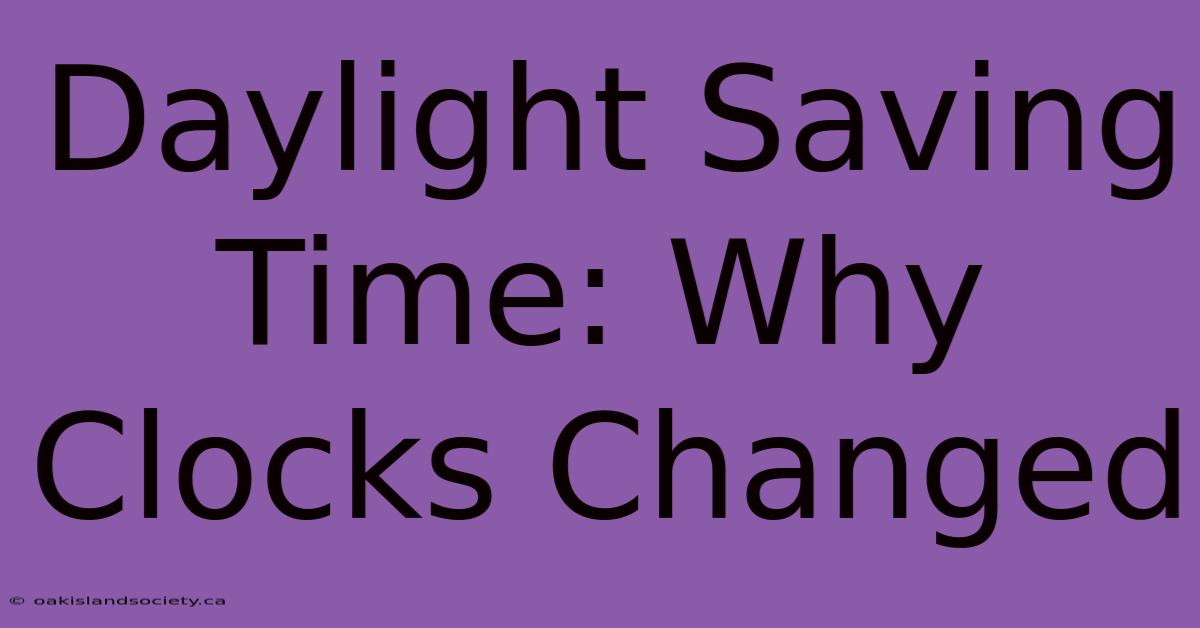Daylight Saving Time: Why Do Our Clocks Change?
Have you ever wondered why we change our clocks twice a year, shifting from standard time to Daylight Saving Time (DST) and back again? It's a practice that has been around for over a century, but its purpose and effectiveness are often debated.
Why This Topic Matters:
Understanding the history and rationale behind DST is crucial because it impacts our daily lives. It affects our sleep schedules, work hours, and even our energy consumption. Knowing the benefits and drawbacks of DST helps us make informed decisions about whether it's a practice worth maintaining.
Key Takeaways:
| Key Takeaway | Explanation |
|---|---|
| DST aims to save energy by extending daylight hours. | By shifting the clock forward, people wake up and go to work during daylight hours, reducing the need for artificial lighting. |
| The practice is controversial, with supporters and opponents. | While proponents cite energy savings and increased productivity, critics argue it disrupts sleep patterns and increases health risks. |
| DST's effectiveness is debated, with no conclusive evidence. | Studies have yielded mixed results on its impact on energy savings, traffic accidents, and crime rates. |
Daylight Saving Time: A Brief History
The idea of shifting clocks to take advantage of daylight hours originated in the 18th century, but it wasn't until World War I that DST was widely implemented. Germany adopted it in 1916 to conserve fuel during wartime, and other countries followed suit. The United States first implemented DST in 1918, but it was repealed in 1919. It was reintroduced during World War II and became more widely adopted throughout the latter half of the 20th century.
Key Aspects of Daylight Saving Time:
- Clock Shift: During DST, clocks are moved forward one hour, effectively adding an extra hour of daylight in the evening.
- Seasonal Implementation: DST typically begins on the second Sunday of March and ends on the first Sunday of November, aligning with the changing seasons.
- Energy Savings: The primary argument for DST is that it conserves energy by reducing the amount of electricity needed for lighting.
- Productivity and Safety: Supporters also claim that DST promotes outdoor activity, boosts economic activity, and reduces traffic accidents due to increased visibility.
The Debate Surrounding DST:
While the benefits of DST are often cited, there are also strong arguments against it:
- Sleep Disruption: The abrupt shift in sleep patterns can cause sleep deprivation, which leads to fatigue, irritability, and reduced productivity.
- Health Risks: Studies have linked DST to increased heart attacks, strokes, and other health problems.
- Economic Impacts: Some businesses argue that DST disrupts their operations and reduces worker productivity.
- Energy Savings Debunked: Research has shown that energy savings from DST are minimal and sometimes even negative.
Connection Points:
- Sleep Health: DST's impact on sleep patterns raises concerns about sleep deprivation, which can have significant health consequences.
- Public Safety: While proponents argue for increased visibility and reduced accidents, critics point to the potential for increased crime rates during the transition periods.
- Environmental Impact: The debate on energy savings highlights the need for sustainable practices and the potential impact of DST on energy consumption.
FAQ:
Q: Why do we change our clocks twice a year?
A: Clocks are changed to implement Daylight Saving Time, which aims to save energy by extending daylight hours.
Q: When does Daylight Saving Time start and end?
A: DST typically begins on the second Sunday of March and ends on the first Sunday of November.
Q: Does Daylight Saving Time really save energy?
A: The evidence regarding energy savings from DST is mixed, with some studies showing minimal or even negative effects.
Q: What are the health risks associated with DST?
**A: ** Studies have linked DST to increased risk of heart attacks, strokes, and other health problems due to sleep disruption.
Q: Is Daylight Saving Time a good idea?
A: The benefits and drawbacks of DST are debated, with no clear consensus.
Q: Can I choose not to observe Daylight Saving Time?
A: Whether DST is observed depends on the laws of the specific country or region.
Tips for Managing DST:
- Adjust Gradually: A week before the time change, start shifting your bedtime and wake-up time by 15 minutes each day.
- Limit Screen Time: Avoid screens for an hour before bed to improve sleep quality.
- Create a Relaxing Bedtime Routine: Engage in calming activities like reading, meditation, or taking a warm bath.
- Get Regular Exercise: Physical activity can improve sleep quality but avoid strenuous exercise close to bedtime.
- Seek Professional Help: If you experience persistent sleep problems, consult a healthcare professional.
Summary:
Daylight Saving Time remains a controversial topic, with ongoing debate about its effectiveness and potential consequences. While it aims to conserve energy and improve productivity, concerns about sleep disruption, health risks, and limited energy savings continue to fuel the discussion. Ultimately, the decision to observe DST rests on individual values, beliefs, and the overall well-being of the population.
Closing Message:
The debate surrounding Daylight Saving Time reflects a broader societal tension between the desire for convenience and the need for individual health and wellbeing. As we move forward, it's crucial to consider all aspects of this practice and make informed decisions that prioritize the best interests of our communities.

